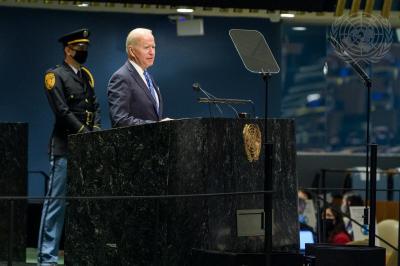Authentic authority and the threat of raw power

On Friday, leaders of 136 nations took actions that should send a chill up the spines of their citizens.
The representatives of those countries acted on a proposal by Organization for Economic Co-operation and Development (OECD) to establish a global business tax.
After recovering from my shock, questions blasted in my mind: Who gave this organization the right to implement a global business tax? Is this an ominous step toward the establishment of other worldwide regulatory mandates? At what point do other global groups act on the precedent by extending their powers into broad facets of policy that should be the purview of sovereign nations?
President Joe Biden and Janet Yellen, secretary of the U.S. Department of the Treasury, applauded the move.
They had both the constitutional authority and the power to do so. However, in the Biden administration, as in others, the balance between authority and power is delicate.
The big issue here has to do with executive authority and power, and the importance of holding it in balance.
The Bible and the histories recorded there, reveal the differences between authentic authority and raw power:
- Authority is granted from the higher to the lower, while raw power is seized
As Jesus stands before the Roman magistrate, Pontius Pilate, He tells him, “You have no authority over Me at all if it had not been given to you from above.”
- Authority is granted to those under authority, but raw power is submitted only to itself
King Saul learns this the hard way. He refuses to honor the commands of Samuel, the High Priest, the representative of God Himself. Saul disobeys, coming out from under Samuel’s authority, and loses his kingdom.
· Authority is accountable to the higher authority; raw power is accountable only to its own interests
Though Jesus Christ is God Himself, in His incarnate existence, He acknowledges His accountability to God the Father, telling even His earthly parents that He had to give priority to His “Father’s business.”
- Authority is sustained through healthy relationship; raw power is sustained by intimidation, manipulation, condemnation and domination
A priority of Jesus was to be “with” His disciples, building and leading them through relationship
- Authentic authority is in the style of servant leadership; raw power is in the style of tyrannical control
“The Son of Man came not to be served, but to serve, and give His life for many,” said Jesus.
All these reveal that true leadership that has the right of power must understand that it can do so only if it respects and yields to the authority granted to it. The leader, be it a president, CEO, senior pastor, head of household — whatever — must not take authority as his or her own possession, but as a trust.
I have watched and been fascinated by the American presidency since 1952. Both national political conventions were televised for the first time that year. As an 11 year old, I sat transfixed for hours watching the drama on our 12-inch black-white TV screen.
Within two decades, I would be standing in the Oval Office as a member of the president’s staff watching the president model the balance between authority and power.
In 1969, new in office, Richard Nixon had to help school systems in 11 southern states desegregate. He brought together multi-racial citizen groups from each state and authorized them with the power to implement educational equality in their own states.
In the fall of 1970, the most sweeping desegregation in history occurred peacefully.
Nixon had the authority, and he shared the power.
Many still hate Nixon and his predecessor, Lyndon Johnson. However, both men took actions based on the careful balance between authority and power that should earn them respect in history, balancing whatever misdeeds attributed to them.
Lyndon Johnson, in 1968, was deep in the morass of the Vietnam war. Cities were burning, and destructive rioting would break out during the Democrats’ summer convention in Chicago.
Johnson, regarded by his opponents as being a thug, nevertheless sacrificed himself for the good of the nation. On March 31, 1968, on national television, Johnson declared, “I shall not seek, and I will not accept, the nomination of my party for another term as your president.”
Six years later, mired in the Watergate scandal, Richard Nixon told the world, “I have never been a quitter. To leave the office before my term is completed is abhorrent to every instinct in my body. But as president, I must put the interest of America first. ... Therefore, I shall resign the presidency.”
Some still smirk at the very mention of Johnson or Nixon, but they were admirable in their actions. They remembered that constitutional authority is held by the people. When Johnson and Nixon faced the fact that they had lost the authorization of the people they realized they could no longer exert the powers of the Oval Office.
These were insightful, gallant actions by two men many still hate.
Is this in America’s future once more?
Does the action of an international group like the OECD mean that authority and power are gravitating to the global scale?
One hopes the Biden White House and his administration understand the nature of authentic authority and the threat of raw power.
Wallace B. Henley’s fifty-year career has spanned newspaper journalism, government in both White House and Congress, the church, and academia. He is author or co-author of more than 20 books. He is a teaching pastor at Grace Church, the Woodlands, Texas.
For media inquiries, contact: [email protected]




























